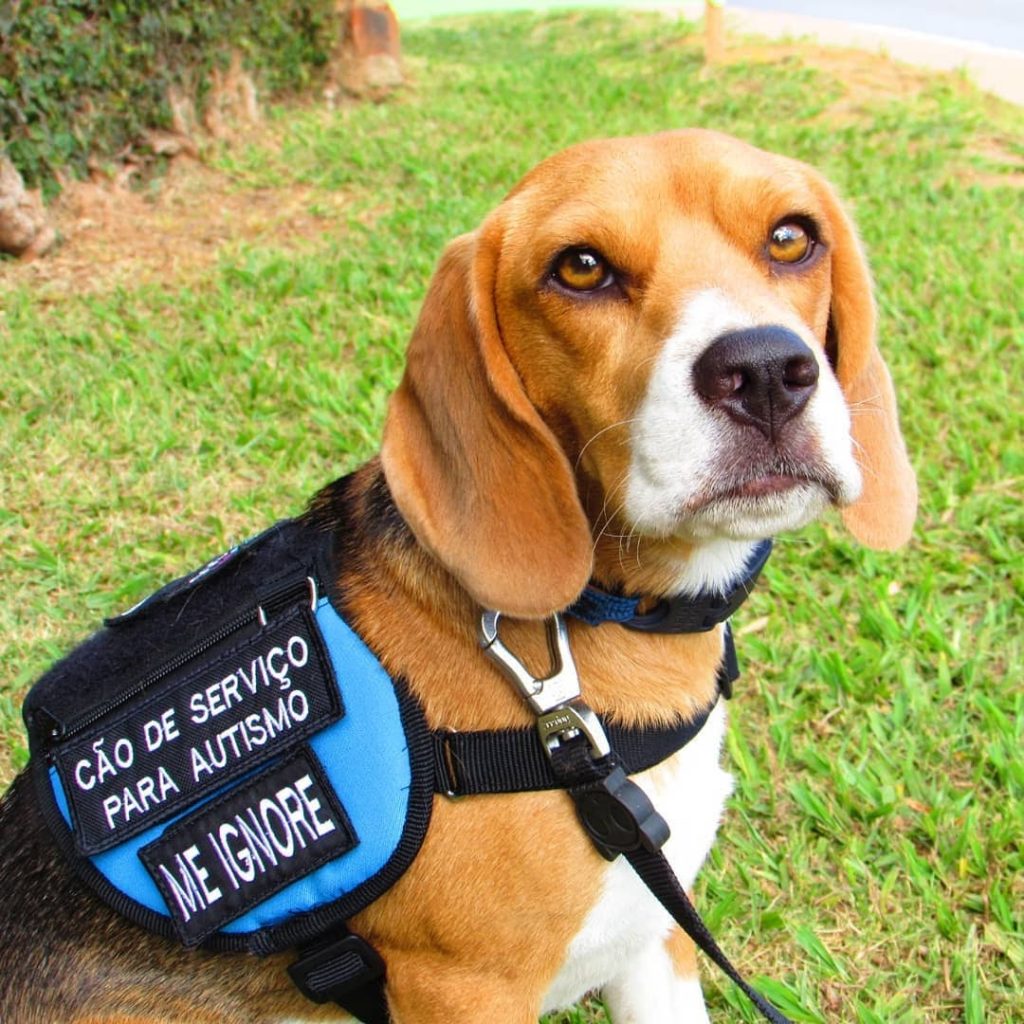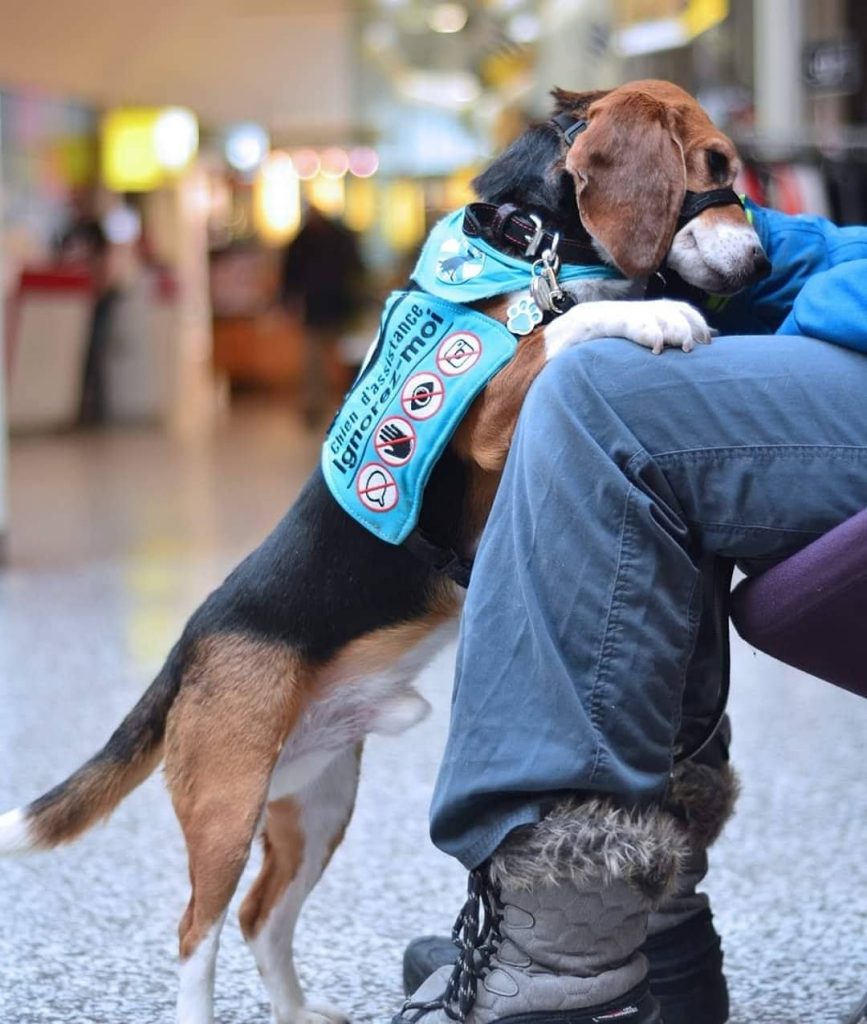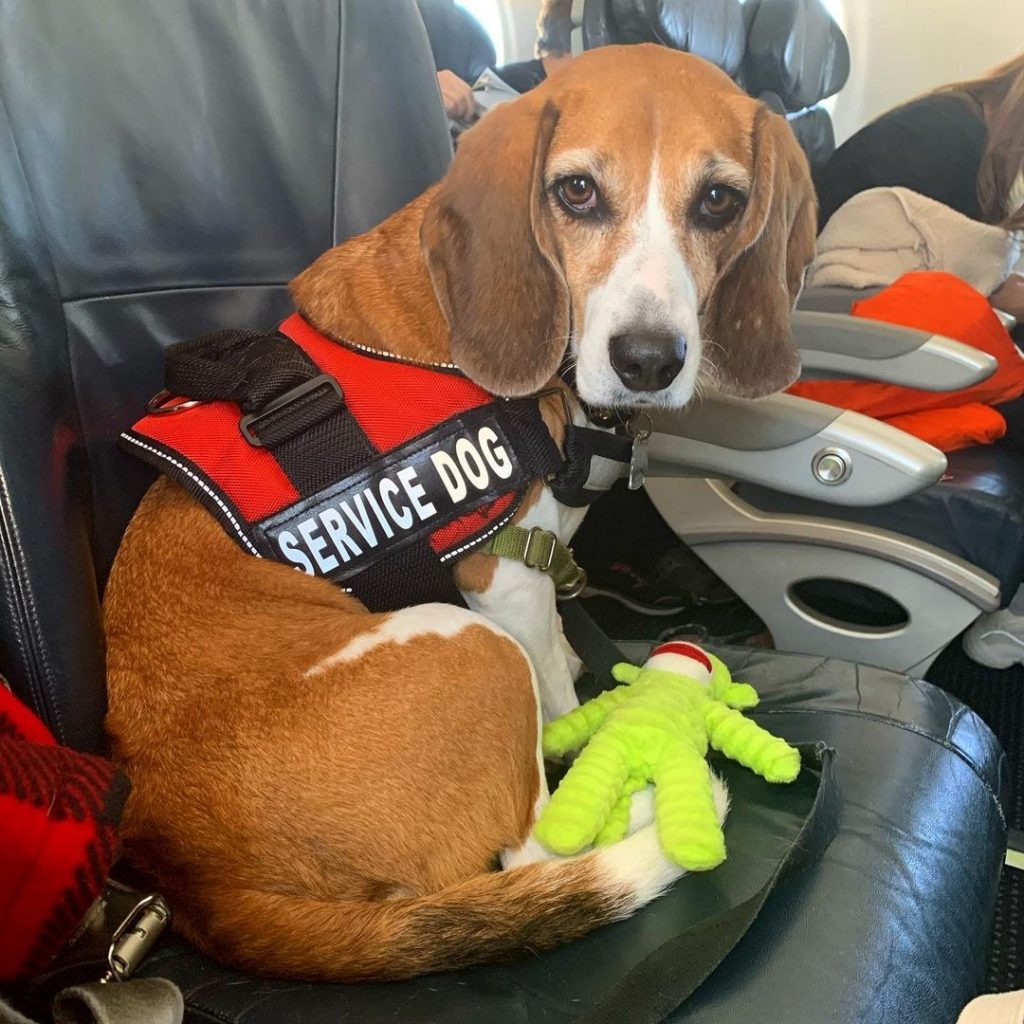Can a Beagle Be a Service Dog? 5 Traits That Your Beagle Can Be a Service Companion
When we think of service dogs, the usual ones that come to mind are German Shepherds, Golden Retrievers, and Labradors who all have one thing in common-a large size. Medium-sized canines such as the Beagle, however, should not be underestimated as they can do the duty as well as the ones mentioned earlier.


Most Beagles have jobs such as working with the police and in the airport for smuggled products – they are reliant, capable, and strong enough to meet the demands of their work. Of course, there would be exceptions, but if the pooch is trained to aid in appropriate service jobs, you’d be amazed as to how well he’ll do it.
Do you have a family member who needs support of some sort? You might want to consider getting a Beagle. Let’s keep on reading to find out how a Beagle can be an excellent service dog.
Table of Contents
What Makes a Beagle a Great Service Dog?
Beagles are naturally compassionate, high-spirited, and hard-working doggies- three traits that are considered important for an assistance dog. If we hear the term, “service dogs” most would assume that these canines must be able to guide, protect, and guard their owners. Considering the size of a Beagle, he might not be an intimidating threat to anyone, but there are particular fields he’ll stand out the best.
He Can Be There for Emotional Support
By nature, Beagles are calm, loving, loyal, and energetic dogs which can help a great deal in uplifting your spirit. Research has shown that a dog such as this one can feel the same emotion if he sees his owner crying.


Further data reveals that he not only shows distress but he would do something to comfort the grieving person. This action, however, is unclear if the dog comforts the owner to relieve himself from the negative atmosphere or to genuinely try to make his human feel better.
An even-tempered Beagle who loves to please his special person will try to keep you from being sad no matter what the real intention is. Some people struggle a lot with mental issues such as depression, Post Traumatic Stress Disorder (PTSD), and phobias. If anyone in your family experiences sudden outbursts, having a Beagle around can ease the discomfort.
Sad to say, but the prominence of having an emotional support animal (ESA) has led people to take advantage of the benefits someone who has a real mental disability could gain from such as having the dog sit beside you in a plane. Nevertheless, this shouldn’t discourage you from getting a pooch who will have your back at all times.
A Beagle Is a Great Therapy Dog
There is a huge difference between getting a Beagle for emotional support and therapeutic purposes. ESA Beagles are normally designated for one person while a therapy Beagle is brought to places like hospitals and nursing homes.
It must be known that having and bonding with a Beagle makes the individual’s body produce higher levels of oxytocin. This “love hormone” can improve the psychological well-being of a patient, elderly, or disabled person. In other words, dogs such as a Beagle pup can make people feel good and are a form of destressing merry packages.


For a Beagle to qualify as a therapy animal, he must be open to getting patted and hugged. This is no problem for the Beagle breed as this dog loves getting attention. Moreover, he should display affection, calmness, and obedience. He should be unfazed when met by different and unfamiliar people and is capable of controlling himself from letting out unnecessary howls and barks.
Surely, no one in the hospital would want a loud and reckless dog.
He Is Capable Of Helping on Work Services
Thinking about working dogs, the ones we could instantly think of are those breeds we often see in the K-9 unit such as the German Shepherd and the Bloodhound. They are intimidating, strong, and the types you wouldn’t want to mess with. Anyhow, as much as most won’t expect, a Beagle is a real police dog too!


His strong sense of smell helps in tracking down illegally imported agricultural products and other materials that are prohibited. You can often see Beagles around the airport sniffing pieces of luggage as well as in the border zones. Additionally, Beagles are dubbed the “narcotic-sniffers”.
Another great thing about this dog being in the working field is that he gives the upper hand when it comes to looking for a missing person. A search and rescue operation stimulates this dog breed both mentally and physically which would be rewarding for them. However, it remains a necessity to motivate Beagles with food and treats so they’d keep moving.
Can a Beagle Be a Disability Service Dog?
Although Beagles do well in other services mentioned, it’s in the disability service category in which they aren’t superior compared to other dog breeds.
Firstly, due to his size, he couldn’t be very much capable of directing a disabled person to a place considered much safer in times of threats or dangers. If the person is using a wheelchair, it’s less likely that an adult Beagle could push it in the right direction.


Another reason is that, due to his extremely sensitive nose, he is highly prone to get distracted by the different scents he could pick up along the way. He is also high in social interactions and when people decide to pet him, he’d enjoy the recognition and might forget about the disabled person’s needs.
Lastly, knowing that a disabled individual might not be able to cope with the activities a normal individual could do, the pace might cause an imbalance if he’s paired with a Beagle. Beagles have high energy levels and anything can excite them. It could be difficult for the owner to catch up with the dog’s activeness.
5 Traits That Your Beagle Can Be a Service Companion


Beagle service dogs help a lot in making thousands of Americans feel better or their work a lot less heavy. However, it’s important to remember that dogs that are great as pets are not cut out to be service animals. Several evaluations are mostly based on the temperament before it is decided that your Beagle fits the mold when it comes to being a support dog.
Here are some of the essential traits your Beagle pup must possess:
- Calm temperament. If you are under a lot of stress and pressure, a Beagle that has an even disposition and calm behavior will not aggravate your situation. Instead, his loving manner will conciliate how you feel. His presence can boost your mood effectively!
Moreover, if he’s a dog working at an airport, a rowdy behavior sure isn’t acceptable. If he’s relaxed and focused on his duty, the process of detecting illegal products will be smooth.
- He doesn’t react negatively when he’s touched. Thankfully, the Beagles are ideally socially open. They love receiving love even from unfamiliar people if they are used to seeing new faces from time to time. Bringing this type of dog to a hospice or a care home can improve the atmosphere inside. Getting petted by random people won’t make him uncomfortable.
- He enjoys being around other people. Since Beagles are usually brought along in particular police missions, it goes without saying that these dogs don’t find any problem at all being around humans. Aside from the fact that the task is fulfilling, Beagles are also inclined to receive affection and rewards every time they do the right thing.
- Eager to please. When your Beagle realizes that you are down, he will instantly feel obliged to cheer you up! Beagles aren’t labeled as “merry dogs” for no reason. They love turning a gloomy atmosphere into a warm and cheery one. Expect him to bring you his favorite toy as a way to make you feel that you are important to him to the point that he can let go of his valued possession!
- He can focus and avoid distractions. This is utterly important for a police dog such as the Beagle. When a task is set out, there is a goal that needs to be attained. If a Beagle is assigned to go and search for a particular scent, he should be able to do so without getting distracted by other smells or animals he might meet in the way.
This is why training is necessary before putting your Beagle out for a crucial assignment.
A Beagle may possess all these traits naturally and you might think he can instantly become a service dog. This is not the case at all. If you need a service or an ESA, training is still imperative. You don’t have to hire a trainer for your dog. The Americans with Disabilities Act (ADA) gives the owner the right to do this himself.
How to Train a Beagle to Become Your Emotional Support Animal


A Beagle puppy who underwent behavioral training right on is a good candidate to become an ESA. After all, becoming a support dog has a lot to do with dealing with his owner or other people’s mental and emotional well-being. Other pieces of training to be included are:
- Socialization. Even though your Beagle is already friendly, he still needs to be taught how to act toward meeting other people. His socialization skills must be on point and his chance of being picky on whom to be friends with should be very low. This training can be done by exposing him to different people, even kids, and asking them to play gently with him.
The only downside of this session is that your Beagle won’t be a suitable guard dog later in life.
- Obedience Training. Beagles are very stubborn dogs, but they, being anxious to please people, balance out this personality. Puppies should be taught early on what the desired behaviors are and what aren’t. You can discipline him and eliminate destructive behaviors through positive reinforcements.
- Basic Commands. A dog shouldn’t just be taught basic commands because he’s going to be an ESA or a service animal. Every canine has to understand house rules and common verbal cues such as ‘sit’, ‘stay’, ‘come’, ‘no’, or ‘stand’. Incorporating words he can be familiar with has to be done consistently until he no longer struggles to understand what you want him to do.
- Relaxation. If there is a high amount of pent-up energy, your Beagle will grow restless and hard to control. Before bringing him to hospitals or other places where he’ll interact with people, he has to be slightly exhausted first such as by playing a game of fetch so he becomes calm and even-tempered.
Do I Have to Register My Beagle as a Service Dog?


No, the ADA doesn’t require registering your Beagle as a service dog. There are a few guidelines, however, pointed toward business owners and employees, so they could identify if your dog has a purpose or is solely considered a pet.
There are 2 questions they could ask:
- Is your service Beagle required because of a disability?
- What task or work is your Beagle trained to do?
Those are the only inquiries they can make. They don’t have to ask for registration or certificate nor ask more about your disability. To make it simpler for you, getting your Beagle to wear a harness to indicate that he’s a working dog or an ESA would also make people assume that he is not to be petted or distracted unless his garments are off.
Does this article convince you about getting a service dog or a support animal? Why not get a Beagle now? He might just be the right companion for you!
